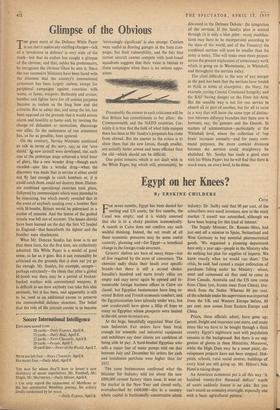Egypt on her Knees?
By ERSKINE CHILDERS
Cairo
FOR seven months, Egypt has been denied her sterling and US assets; for five months, the Canal was empty; and it is widely assumed that she is in a shaky position economically. A month in Cairo does not confirm any such wishful thinking. Indeed, the net result of all these economic pressures may be some useful austerity, planning and—for Egypt—a beneficial change in the foreign-trade structure.
Grocers' shelves are bare of many items—but of few required by the mass of consumers. The chemists sadly shake their heads over specific brands—but there is still a second choice. Ismailia's hundred and more lovely villas are empty and may never again be opened and in- numerable foreign business offices in Cairo are closed; but Egyptian businessmen have long re- sented British and French economic conduct; and the Egyptianisation laws (already under way, but now accelerated) have given a fillip of hope to many an Egyptian whose prospects were limited in the old, never-to-return era.
At the huge, beautifully organised West Ger- man Industries Fair orders have been brisk enough for scientific and industrial equipment and exhibitors say their clients are confident of being able to pay. A hard-headed Egyptian who sells a major line of water pumps told me that between July and December his orders for cash and instalment purchase were higher than for 1955.
The same businessman confirmed what the Minister for Industry told me about the new £800,000 cement factory share issue. It went on the market in the New Year and closed early, oversubscribed by £400,000—this in a country where capital is traditionally conservative about industry. Dr. Sudky said that 90 per cent. of the subscribers were small investors, new to the stock market. 'I myself was astonished, -although we have been hoping for this kind of interest.'
The Supply Minister, Dr. Ramses Stino, had just sent off a mission to Spain, Switzerland and West Germany to buy essential pharmaceutical goods. 'We organised a planning department here only a year ago—people in the Ministry who do nothing but plan for supplies of imports. We knew exactly when we would run short.' The crisis, he said, had caused a major redirection of purchases falling under his Ministry : wheat, meat and cottonseed oil that used to come in from Canada, Australia and the US now come from China (yes, frozen meat from China), live- stock from the Sudan. Whereas 80 per cent. of the schedule under his supervision was imported from the UK and Western Europe before, 80 per cent. now comes from Eastern Europe and China.
Prices, these officials admit, have gone up; petrol, freight and insurance cost more, and many items like tea have to be bought through a third country. Egypt's nightmare race with population remains in the background. But there is no sug- gestion of gloom in these Ministries. Moreover, while the High Dam may be a moot point, de- velopment projects have not been stopped. HoS- pitals, schools, rural social centres, buildings of every kind are still going up. Mr. Hilton's Nile Hotel is taking shape.
An American economist put it all this way. 'A hundred twenty-five thousand dollars' worth of assets suddenly frozen is no joke. But you can't smash an economy overnight, especially one with a basic agricultural pattern.'


































 Previous page
Previous page